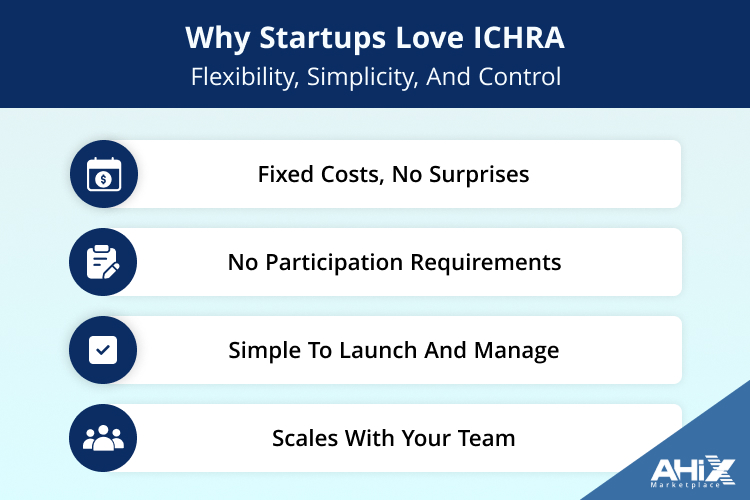Enter your ZIP code on AHiX Marketplace to compare ACA-compliant individual health plans available in your area.
Startups today look very different from just a decade ago. Teams are leaner, more remote, and often spread across multiple states. In this fast-paced environment, traditional employee benefits, especially health insurance, haven’t kept up. Founders are left juggling high premiums, regional plan limitations, and rigid policies that don’t support how modern businesses operate.
So now, startup health insurance needs serious rethinking.
Why Startup Health Insurance Needs Rethinking?
Offering health insurance as a startup or growing business is no longer a “nice-to-have”—it’s a critical part of attracting and retaining top talent. But for startups with limited budgets and employees spread across different states, choosing a traditional group health plan often leads to complexity, high costs, or limited coverage.
That’s where ICHRA (the Individual Coverage Health Reimbursement Arrangement) comes in. Unlike conventional group plans, ICHRA gives startups and small businesses the flexibility to reimburse employees for the individual health insurance plan of their choice.
Whether you’re hiring your first employee or managing a remote team across several states, ICHRA may be the best health insurance solution for startups that want to offer benefits without overextending their resources.
Let’s explore why ICHRA is becoming the go-to choice for startup health insurance and how it fits perfectly into the modern way of working.
What Is ICHRA and How Does It Work?

An Individual Coverage Health Reimbursement Arrangement (ICHRA) is a modern alternative to traditional group health insurance tailor-made for startups, small businesses, and employers with remote or multi-state teams.
Instead of offering a one-size-fits-all group plan, companies using ICHRA set a fixed monthly allowance that employees can use to purchase their own individual health insurance plan. This means your employees choose a plan that best fits their needs, and you reimburse them—tax-free—for qualified health expenses.
Here’s why this model works so well, especially for health insurance for startups:
- Employees have choice – They can select any ACA-compliant health plan in their state.
- Startups control the budget – You decide how much to reimburse each month.
- Easy to scale – As your team grows, ICHRA grows with you—without the administrative hassle of traditional plans.
ICHRA is also fully ACA-compliant, making it a smart long-term solution for startups that expect to cross the 50-employee threshold.
This flexibility makes ICHRA one of the best health insurance options for startups and companies with employees in different states. You no longer have to worry about managing multiple regional group plans or dealing with complex compliance rules across state lines.
Why Startups Love ICHRA: Flexibility, Simplicity, and Control

Startups face unique challenges when it comes to offering employee benefits. Limited budgets, lean HR teams, and unpredictable growth make it hard to commit to rigid group health insurance plans. That’s exactly why ICHRA has emerged as a game-changer in the world of startup health insurance.
Here’s how ICHRA meets the real-world needs of startups:
Fixed Costs, No Surprises
With ICHRA, you set a monthly reimbursement limit per employee. This gives your startup complete control over its benefits budget without worrying about rising group plan premiums year after year.
No Participation Requirements
Unlike group health plans that often require a minimum number of enrollees, ICHRA works whether you have 2 or 20 employees. That makes it ideal for early-stage companies or small teams just starting to scale.
Simple to Launch and Manage
There’s no need for complex group enrollment. Employees find a plan on their own, and you simply reimburse eligible expenses. The process is streamlined and manageable—even without a dedicated HR department.
Scales With Your Team
As your company grows, ICHRA grows with it. You can adjust allowances, set up different employee classes (such as full-time vs. part-time), and continue offering competitive health benefits for startups without switching systems.
Whether you’re a founder evaluating health insurance for startup employees or a business leader looking for simplicity, ICHRA gives you the control and predictability that traditional group plans often lack.
Ready to see how ICHRA supports modern remote teams? Let’s continue!
Multi-State and Remote Team Ready: A Nationwide Solution
As more startups embrace hybrid or fully remote work models, offering health insurance across multiple states becomes a logistical challenge. Traditional group health plans often don’t cover employees outside a specific region—or if they do, the premiums skyrocket.
This is where ICHRA shines as a powerful solution for multi-state employee health insurance and employee health insurance for remote teams.
Why ICHRA Works Across State Lines
With ICHRA, you’re no longer bound by a single provider or regional network. Instead, each employee chooses an individual health insurance plan that fits their needs and is available in their home ZIP code. Whether your team is based in California, Texas, or working from co-working spaces around the country, ICHRA adapts to each location seamlessly.
Ideal for Distributed Startups
Many growing startups now hire talent across the U.S. to access the best candidates. Managing group coverage for employees in different states is complicated and expensive. But with ICHRA, you skip those hurdles entirely while still offering valuable health benefits for startups and remote teams.
Benefits for Founders and HR Teams
- No need to negotiate multi-state group plans
- No juggling provider networks
- Easy to maintain compliance in every location
- Your team gets consistent benefit quality—regardless of where they live
In short, ICHRA is designed for the way modern startups operate distributed, digital, and dynamic. However, it doesn’t end here; let’s also explore another core advantage of ICHRA that startups value.
Benefits and Compliance Made Easy
One of the most overlooked advantages of ICHRA especially for startup founders and small business owners—is how it simplifies taxes and regulatory compliance while offering meaningful savings.
Tax-Free for Startups and Employees
When structured properly, reimbursements made through ICHRA are tax-free for both employers and employees. That means your business avoids payroll taxes on the allowance, and employees don’t owe income tax on the amount they use to pay for their individual health plans.
For cost-conscious startups, this structure offers the dual benefit of health insurance for startups without triggering additional tax liabilities—something traditional group plans often can’t guarantee as cost-effectively.
ACA Compliance Without the Complexity
As your startup grows, staying compliant with the Affordable Care Act (ACA) becomes increasingly important. ICHRA helps you meet ACA employer mandate requirements by offering minimum essential coverage when employees purchase qualifying individual plans.
This is especially valuable for startups with multi-state employees or businesses nearing the 50 full-time equivalent (FTE) threshold. ICHRA lets you scale your benefits offering while staying legally compliant—without needing to constantly rework your benefits strategy.
Great for Long-Term Growth
Offering a compliant, tax-efficient health benefit also shows your team that you’re building a business with sustainability and responsibility in mind. It makes your startup more attractive to top-tier talent and future investors.
ICHRA doesn’t just simplify health benefits; it positions your company for smarter growth with fewer tax and compliance headaches along the way. But the question is how startups can use ICHRA to tailor benefits by role, team type, or location for maximum efficiency. Let’s see!
Customization Options: One Size Doesn’t Fit All
When it comes to health insurance for startups, flexibility isn’t just a perk—it’s a necessity. With ICHRA, you’re not locked into a rigid benefits structure. Instead, you can tailor your reimbursement strategy based on your team’s real-world needs.
This level of customization makes ICHRA one of the best health insurance options for startups looking to scale across roles, locations, and employment types.
Segment by Employee Class
Startups often have a mix of full-time employees, part-timers, remote workers, and contractors. ICHRA lets you offer different reimbursement amounts for different employee classes all while remaining ACA-compliant.
Example use cases:
- Offer higher allowances to full-time staff and a different tier for part-timers.
- Create separate benefit levels for in-office teams vs. remote employees.
- Adjust reimbursement based on geographic cost of living.
Total Budget Control With Fairness
This ability to customize ensures that your health benefits for startups remain both fair and strategic. You reward team members based on their contribution and cost context—without overspending or overcomplicating your HR.
Our Suggestion:
At AHiX Marketplace, we recommend ICHRA to growing startups that want to offer employee health insurance for remote teams or across multiple states without sacrificing flexibility or predictability. It’s a future-ready solution for businesses that are scaling fast and smart.
Explore smarter benefit options.
Use our platform to discover how ICHRA can work for your startup with the flexibility your team deserves.
Get Free Health Plan Quotes with AHiX
How ICHRA Compares to Traditional Group Health Insurance

Choosing the right startup health insurance strategy often comes down to comparing two options: traditional group health plans and the individual coverage HRA (ICHRA) model.
Here’s how they stack up for startups and growing businesses:
Traditional Group Plans
- Often require a minimum number of participants
- Offer limited plan choices for employees
- Costly monthly premiums with unpredictable rate hikes
- Require time-consuming administration and renewals
- Not designed for remote or multi-state teams
ICHRA for Startups
- No minimum participation required works even for teams under 10
- Employees pick their own plans from the open market
- Startups set fixed reimbursement budgets, no surprise costs
- Works seamlessly across state lines
- Easier to manage with automated reimbursement platforms
This clear contrast is why many founders are now prioritizing ICHRA as the best health insurance for startups—especially those with employees spread out in different states or working remotely.
Break free from one-size-fits-all plans.
See how AHiX helps startups personalize benefits using ICHRA.
Compare Individual Plans Now
Is ICHRA Right for Your Startup or Growing Business?

If you’re exploring health insurance for startups, you’re likely trying to strike the perfect balance between affordability, flexibility, and employee satisfaction. The good news? ICHRA checks all those boxes especially for lean teams and remote-first companies.
Here’s when ICHRA makes the most sense for your startup:
You Have a Small or Growing Team
Whether you’re a solo founder or managing a team of 5 to 50, ICHRA allows you to start small and scale your benefits strategy as your headcount grows. There are no minimum participation requirements, making it ideal for early-stage startups.
Your Employees Are in Multiple States
If your team is distributed across state lines, traditional group health plans become tricky and expensive. With ICHRA, your employees choose from individual health insurance plans available in their own state—keeping things simple, fair, and consistent.
You Want Budget Predictability
Startups thrive on cost control. ICHRA enables you to define a monthly reimbursement amount per employee, so you know exactly what you’re spending on health benefits—month after month.
You Want to Offer Competitive Health Benefits
ICHRA helps level the playing field. Instead of a rigid group plan, your employees enjoy the freedom to choose coverage that fits their lifestyle and health needs. It’s a compelling benefit that improves hiring and retention.
Whether you’re evaluating employee health insurance for remote teams or seeking scalable health benefits for startups, ICHRA is one of the most adaptable solutions available today.
Final Thoughts: ICHRA Is the Future of Startup Health Insurance
In today’s fast-moving business world, startups need solutions that are flexible, affordable, and scalable. When it comes to offering health benefits, ICHRA stands out as a modern, effective alternative to traditional group plans.
Whether you’re navigating multi-state employee health insurance challenges or simply trying to offer better coverage without blowing your budget, ICHRA empowers you to:
- Control costs with predictable monthly reimbursements
- Offer employees real choice with individual health insurance options
- Stay compliant with ACA regulations as your business scales
- Customize benefits across employee classes, locations, and roles
- Attract and retain top talent with competitive, personalized coverage
It’s no surprise that more founders are recognizing ICHRA as the best health insurance for startups especially those that are remote-first, growing fast, or hiring across state lines.
AHiX Marketplace Can Help
At AHiX, we make it easy for startups to explore and compare individual health insurance plans. If you’re ready to build a smarter benefits package using ICHRA, we’re here to help you and your employees find the right coverage—quickly and confidently.Ready to Simplify Startup Health Insurance for Your Team?
Let your team choose. You stay in control.
Give your employees the freedom to choose their own plan—no matter where they live. With ICHRA, you control the budget, stay ACA-compliant, and offer benefits that scale as you grow.
Use AHiX to explore affordable ICHRA-compatible plans today.
FAQs:
1. What is ICHRA, and how can it help my startup offer health insurance?
ICHRA stands for Individual Coverage Health Reimbursement Arrangement. It lets your startup reimburse employees—tax-free—for their own health insurance plans. This gives your team more freedom to choose coverage that fits their needs, and helps you stay in control of your budget. It’s a flexible and affordable solution for startup health insurance.
2. Can I use ICHRA if my employees are in different states?
Yes, absolutely. ICHRA works perfectly for multi-state employee health insurance needs. Since employees buy their own plans based on their ZIP code, you don’t have to worry about managing regional networks or multiple group policies. It’s ideal for remote teams and startups hiring across the country.
3. Is ICHRA better than a traditional group health insurance plan?
For many startups, yes. ICHRA gives you more control, fewer administrative headaches, and lets employees pick the health plan that works for them. Unlike traditional group plans, there are no minimum participation rules and no one-size-fits-all approach. That’s why it’s becoming the best health insurance for startups.
4. How much can I reimburse employees through an ICHRA?
That’s up to you. You set a monthly allowance that fits your budget. Some startups offer the same amount for all employees, while others customize it by role or location. It’s one of the reasons ICHRA is so popular for health benefits for startups, you’re in control.
5. Will my employees still be ACA-compliant with ICHRA?
Yes! As long as your employees use ICHRA funds to buy an ACA-compliant individual health insurance plan, they’re covered. ICHRA also helps you meet employer mandate requirements if you have 50 or more full-time employees.
6. Can I use ICHRA for part-time or remote employees?
A: Definitely. You can offer ICHRA to different classes of employees including part-timers, freelancers, and remote workers. It’s one of the easiest ways to provide employee health insurance for remote teams without the complexity of group coverage.
7. Do employees like using ICHRA?
Most do. ICHRA gives them the power to choose their own plan, doctor network, and deductible level. They’re not locked into a one-size-fits-all plan anymore. Plus, it’s portable if they move or change roles, they can keep their coverage.



